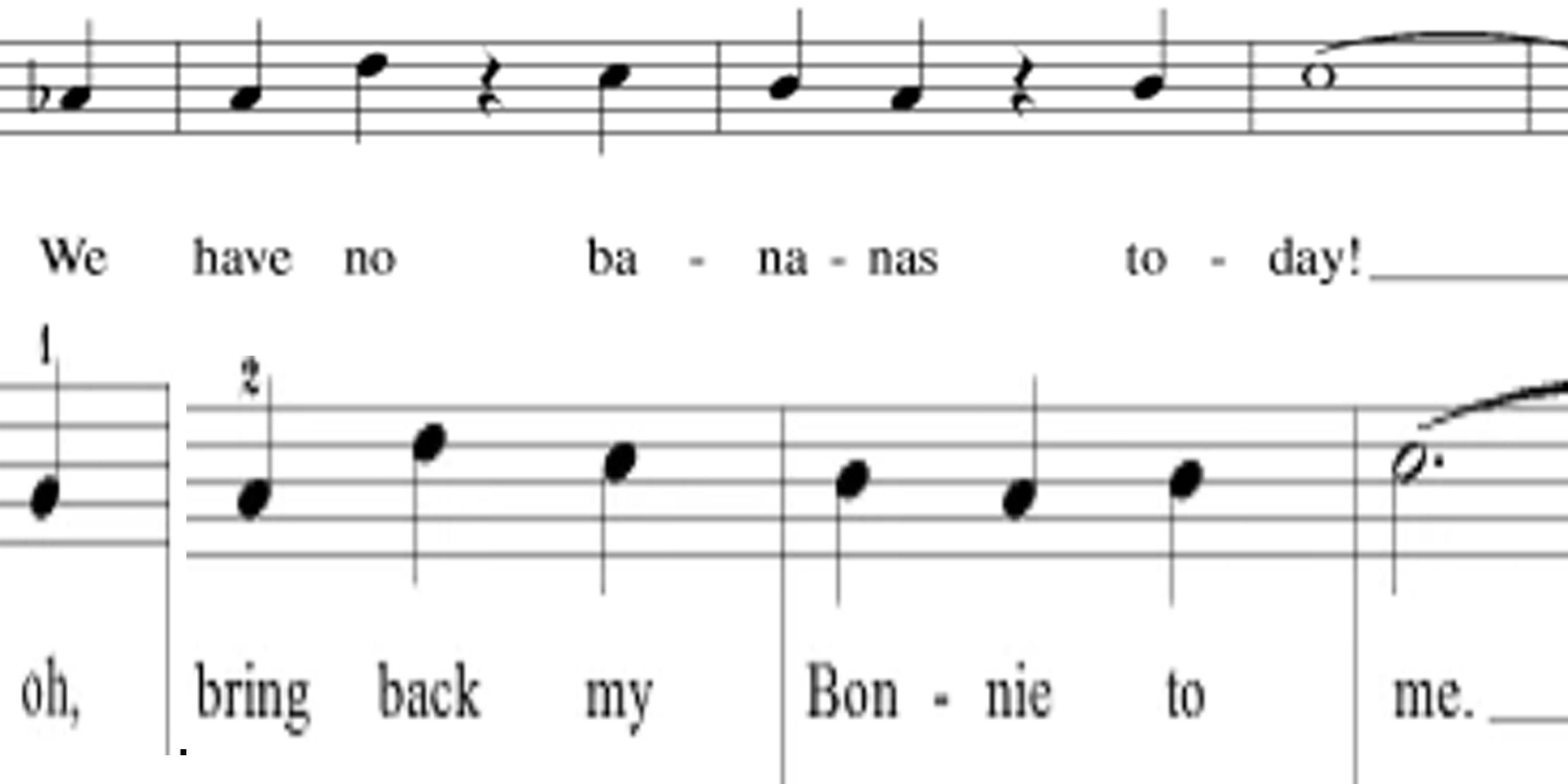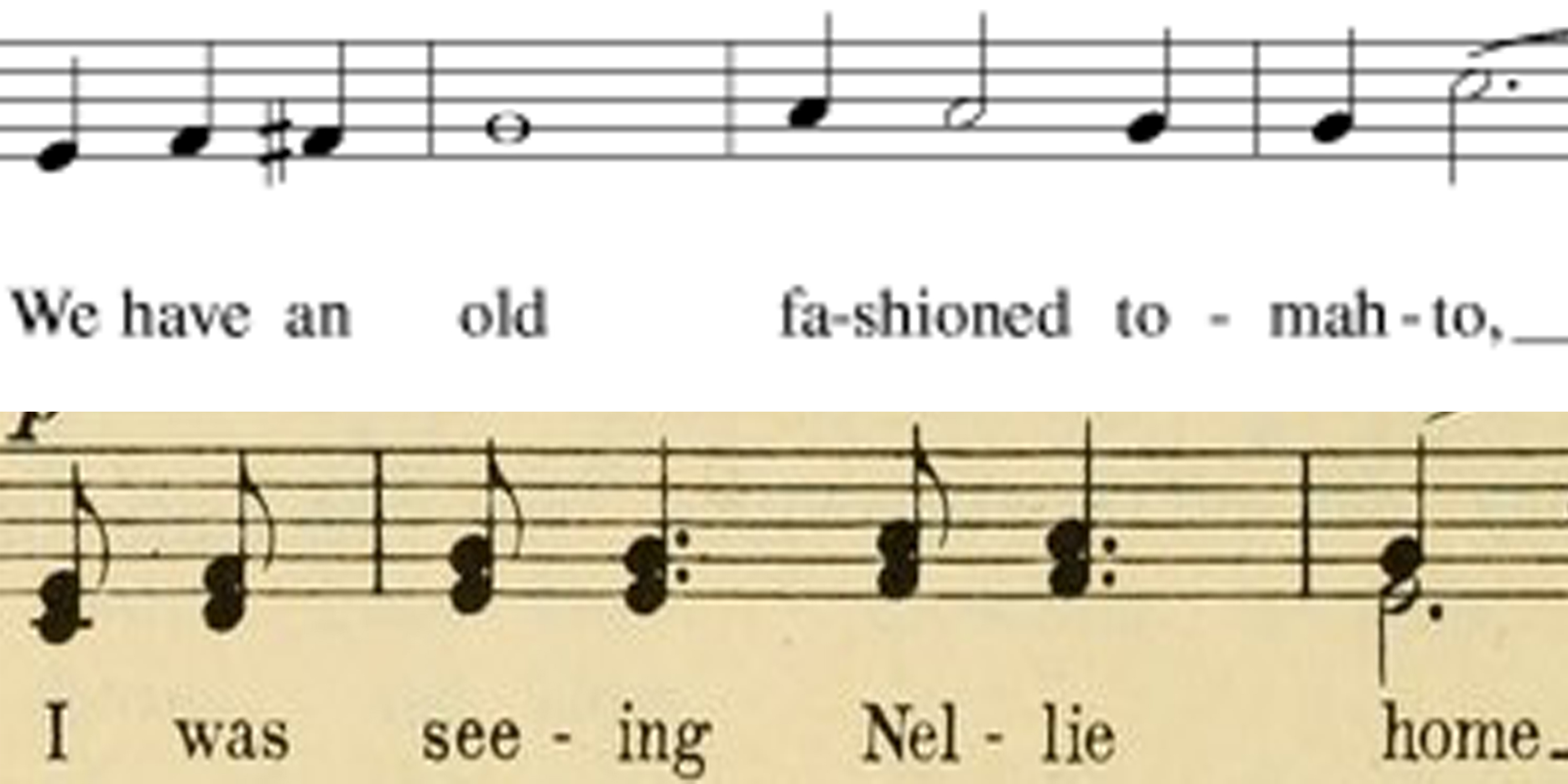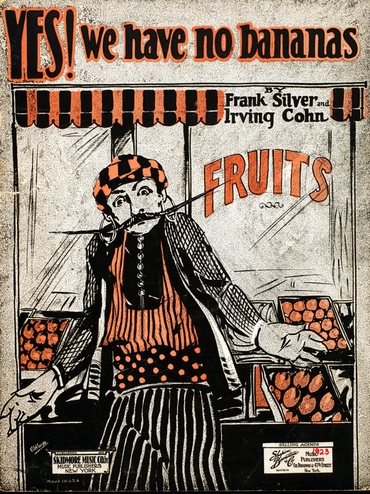Okay, enough with the end of the world as we know it. Time for something jollier.
A week or two back I was listening to New England radio colossus Howie Carr, who has an assistant at his Florida redoubt who helps him out with photocopying and whatnot. The rest of the time the young slip of a lad works at a Publix supermarket. I'm not sure which is the day job and which is what he really wants to do, but nevertheless Howie had him on air to talk about the great toilet-paper stampedes. And in the course of the conversation he mentioned that there was also a run on bananas. I don't know whether that's just in the Sunshine State or more broadly, and don't ask me why: Presumably bananas, like everything else, are all made in China now. And, as with face masks and antibiotics, the Politburo are threatening to cut off our supply. At any rate, the young 'un had been forced to inform his increasingly aggressive customers that they were out of bananas.
And Howie said no, what you should say to them is: "Yes, we have no bananas. We have no bananas today."
I couldn't tell if the kid got the reference, but he would have just under a century ago. In the late Twenties "Yes! We have no bananas" was the most widely used vernacular expression in the English-speaking world. In the Depression years, it was the communal chant of Belfast's protesters petitioning for relief under the 1601 Poor Act - because it was a rare cultural artefact treasured by both Prods and Papists. Who knew that the answer to the Irish Question is "Yes! We have no bananas"? I refer interested readers to Paddy Devlin's book of the same name, subtitled "outdoor relief in Belfast, 1920-1939".
At any rate, before it became a Publix shelf-filler's mournful refrain during the Coronapocalypse, it was an enduring song. All together now:
It sounds like the sort of nonsense ditty that just arises one night round a campfire or in a mess hut and spreads by word of mouth. But in fact it was written by two actual individual human beings - Frank Silver, a Boston-born band leader, and Irving Cohn, a London-born immigrant who subsequently changed his name to "Irving Conn". As Silver told it in June 1923:
I am an American, of Jewish ancestry, with a wife and a young son. About a year ago my little orchestra was playing at a Long Island hotel. To and from the hotel I was wont to stop at a fruit stand owned by a Greek, who began every sentence with 'Yess.' The jingle of his idiom haunted me and my friend Cohn. Finally I wrote this verse and Cohn fitted it with a tune:
Yess, we have no bananas
We have no bananas today
We have stringbeans and onions
Cabbages and scallions
And all kinds of fruits, and, say
We have an old-fashioned tomahto
A Long Island potahto
But yess, we have no bananas
We have no bananas today!The crazy song has captured the country and a fortune is coining my way.
That last bit is certainly true. Silver and Cohn first sang it at a roadhouse on Long Island and it seemed to go down well, so they did it again at Murray's Restaurant in New York City. And then two guys who had never sold a single song set about finding a publisher. Shapiro, Bernstein, one of the biggest music houses in Tin Pan Alley, liked the idea, but they weren't too impressed by the number so they got their staff writers to help out Cohn and Silver. Among those who allegedly contributed bits and pieces to "Yes! We Have No Bananas" were Lew Brown (writer of "Life Is Just a Bowl of Cherries", "Sonny Boy" and many more), Jamey F Hanley (composer of "Second Hand Hose"), and Ballard MacDonald (lyricist of "Trail Of The Lonesome Pine" and "Somebody Loves Me"). One notes, however, that the introductory verse hews pretty closely to the tale of how Frank Silver came up with the song:
There's a fruit store on our street
It's run by a Greek
And he keeps good things to eat
But you should hear him speak!
When you ask him anything
He never answers no
He just yesses you to death
And as he takes your dough
He tells you...Yes! We Have No Bananas...
From that first flush of recordings in 1923, here's the biggest-selling - from one half of radio's Happiness Boys, Billy Jones:
It was a sensation. As Time magazine reported on July 2nd 1923:
YESS! we have no bananas. This fact, although somewhat mitigated by the adequate supply of onions, cabbages, tomatoes, is the outstanding musical fact of the hour.
We have no bananas today. Where is the clergyman, college president, banker, lawyer, beggarman, society or labor leader or Congressman who is not thoroughly alive to this unprecedented situation?
Indeed. Setting aside clergymen, beggarmen and congressmen, music men were alive mostly to the horror of the situation: Old-time songwriter James Thornton, author of "She May Have Seen Better Days", "My Sweetheart's the Man in the Moon" and the lovely "When You and I were Sweet Sixteen", was so aghast by the success of "Bananas" that he fell into a deep funk and, though the most prodigious of drinkers, immediately gave up alcohol for the rest of his life on the grounds that, while the bottle could banish most cares, it could not banish "Yes! We Have No Bananas".
Others marked the "Bananas" phenomenon as a sign of America's terminal decline. As Will Rogers wrote:
I have read quite a lot in the papers about the degeneration of America by falling for a thing like it. Some lay it to the effects of prohibition, some say it is the after effects of war, that it is liable to follow every big war. I see where some have written editorials on the song claiming that things are always in an unsettled state the year before a presidential election. I claim it's due to none of these causes at all; neither is it due to the French occupation of the Ruhr*. I claim that it is the greatest document that has been penned in the entire history of American Literature...
I would rather have been the Author of that Masterpiece than the Author of the Constitution of the United States.
As with any monster hit, alternative "Authors of that Masterpiece" quickly emerged. Tad Dorgan claimed that he had used it in a newspaper cartoon and filed a copyright suit for ownership of the expression. As Funk & Wagnall have anointed Mr Dorgan as "the most fecund maker of American slang" - the coiner of "dumbbell", "hard-boiled", "cat's meow", "cat's pajamas", "for crying out loud", "busy as a one-armed paperhangar" and many more - one must take the claim seriously. On the other hand, American troops in the Philippines recounted that, long before the song emerged, it had been regularly used by a Greek pedlar near their base.
Whatever the origin of the title, however, what is truly amazing, given the number of writers who helped out on the song, is that, with the exception of the three notes for "bananas", the entire melody contains not one original musical phrase - at least according to Sigmund Spaeth, the eponymous star of radio's "Tune Detective" and a frequent expert witness in plagiarism suits. According to Spaeth, the opening is from the Hallelujah Chorus of Handel's Messiah (1741). Here's the Royal Choral Society in their annual Good Friday performance at the Royal Albert Hall (not this year of course):

The next line is from the Scottish folk song "My Bonnie Lies Over the Ocean", best known in the 1881 assemblage of Charles E Pratt. Here's the Beatles version:

The second section comes from "I Dreamt I Dwelt in Marble Halls", the big take-home tune from Michael William Balfe and Alfred Bunn's hit Drury Lane operetta of 1843, The Bohemian Girl. Australia's Dame Joan Sutherland loved that song, and sang it her entire life. Here she is with the LSO conducted by her husband Richard Bonynge:

The third section comes from "Seeing Nellie Home" (or "Aunt Dinah's Quilting Party") by John Fletcher and Frances Kyle, an American backporch favorite from the 1850s, with a bit of help from a very early Cole Porter song and his first real success, "An Old Fashioned Garden". Here's Johnny Cash seeing Nellie home:

And here's Olive Kline with Cole Porter's "Old-Fashioned Garden" from Hitchy Koo of 1919:

And all the above would have been well known to any aspiring songwriters of 1923. In other words, every thing except "Bananas" was written by someone else, which may explain why Irving Cohn and Frank Silver never had another hit - and never needed one, thanks to James Hanley, Lew Brown, Ballard MacDonald, Cole Porter, Frances Kyle, John Fletcher, Charles E Pratt, William Balfe, Alfred Bunn, George Frideric Handel, Tad Dorgan and several US soldiers based in the Philippines. If you want to test Sigmund Spaeth's theory, he proposed you find an instrumental version and sing these words:
Hallelujah, bananas
Oh, bring back my Bonnie to me
I dreamt that I dwelt in marble halls
The kind that you seldom see
I was seeing Nellie home
To an old-fashioned garden
But hallelujah, bananas
Oh, bring back my Bonnie to me!
Still and all, if you take a couple of bars of Handel, a couple of Cole Porter and connect it up with a bit of a London operetta from the 1840s, the result will be, whether or not it's strictly "original", something new in and of itself. It's the equivalent today of taking, say, two bars of Pachelbel's Canon, four bars of "F**k Tha Police" and stringing it out with a bit of the theme from The Magnificent Seven: it's trickier than you think to pull that off. And, having done it, Silver and Cohn never again made lightning strike. They remain the only one-hit songwriters with five other hits in their one hit.
Let's close it out with a guy I miss quite a bit these days, Anthony Newley. His tics and mannerisms were much mocked in their day, but he sure took those bananas and made them peal:
Oh, and a quick PS. At least one of those contributing Shapiro Bernstein songwriters, James F Hanley, got an "answer song" out of it. For everyone in a Florida Publix, here's Eddie Cantor:
*Historical reference note: More on the French occupation of the Ruhr right here on Tuesday.
~If you enjoy our Sunday Song of the Week, we have a mini-audio companion, a bonus Song of the Week Extra, midweek on our Coronacopia edition of The Mark Steyn Show - and sometimes with special guests from Mark's archive, including Eurovision's Dana and Paul Simon.
Our Netflix-style tile-format archives for Tales for Our Time and Steyn's Sunday Poems have proved so popular with listeners and viewers that we thought we'd do the same for our musical features just to provide some mellifluous diversions from the Coronapocalypse. Just click here, and you'll find easy-to-access live performances by everyone from Herman's Hermits to Liza Minnelli; Mark's interviews with Chuck Berry, Leonard Bernstein and Bananarama (just to riffle through the Bs); and audio documentaries on P G Wodehouse's songs, John Barry's Bond themes, sunshine songs from the Sunshine State, and much more. We'll be adding to the archive in the months ahead, but, even as it is, we hope you'll find the new SteynOnline music home page a welcome respite from house arrest without end.
If you're a Mark Steyn Club member and you disagree with any or all of the above, feel free to slip a banana peel under Mark's feet in our comments section. As we always say, membership in The Mark Steyn Club isn't for everybody, and it doesn't affect access to Song of the Week and our other regular content, but one thing it does give you is commenter's privileges. Please stay on topic and don't include URLs, as the longer ones can wreak havoc with the formatting of the page.

